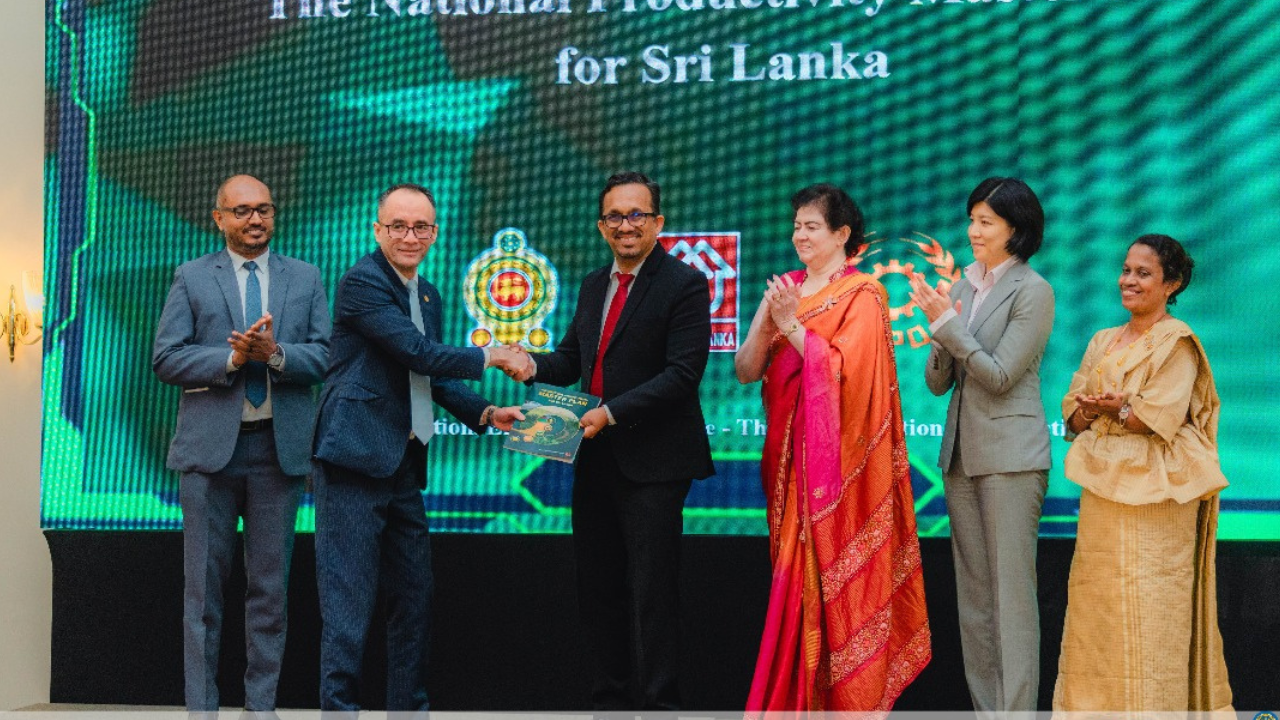
Select Page
 APO Secretary-General Dr. Indra Pradana Singawinata (second from left) hands over the Sri Lanka National Productivity Master Plan to Hon. Sunil Handunneththi, Minister of Industry and Entrepreneurship Development. The handover was witnessed by Niranja S. Jayakodi, Director of the National Productivity Secretariat (left); J. M. Thilaka Jayasundara, APO Director for Sri Lanka (third from right); Jung Hyun La, Specialist from Korea Development Institute (second from right); and Lasitha Dewage, Deputy Director of the National Productivity Secretariat (right).
APO Secretary-General Dr. Indra Pradana Singawinata (second from left) hands over the Sri Lanka National Productivity Master Plan to Hon. Sunil Handunneththi, Minister of Industry and Entrepreneurship Development. The handover was witnessed by Niranja S. Jayakodi, Director of the National Productivity Secretariat (left); J. M. Thilaka Jayasundara, APO Director for Sri Lanka (third from right); Jung Hyun La, Specialist from Korea Development Institute (second from right); and Lasitha Dewage, Deputy Director of the National Productivity Secretariat (right).
Sri Lanka has taken a decisive step toward a more competitive, resilient, and inclusive future with the launch of its National Productivity Master Plan in Colombo on 20 November 2025. Developed by the Ministry of Industry and Entrepreneurship Development and the National Productivity Secretariat of Sri Lanka, with technical support from the APO in collaboration with the Korea Development Institute, the plan sets out a five-year roadmap to move the country from crisis response to productivity-led, innovation-driven growth. APO Secretary-General Dr. Indra Pradana Singawinata described the master plan as “not a decorative document” but “a choice” to shift from a model driven by borrowing and short-term fixes to one anchored in competitiveness, innovation, and inclusion so that recovery becomes self-sustaining.
The launch ceremony brought together senior political and policy leaders who underscored that productivity is now at the heart of Sri Lanka’s development agenda. The Secretary of the Ministry of Industry and Entrepreneurship Development, J. M. Thilaka Jayasundara, stressed that modernization, innovation, and transformation are key to productivity improvement. She shared the ministry’s ambition to “design a national productivity drive” encompassing kindergartens, schools, universities, the private sector, the public sector, and the entire community as the country pursues ambitious targets for industrial output, exports, and job creation. Deputy Minister Hon. Chathuranga Abeysinghe called the launch of the plan “a historic moment” and “a turning point for the country,” arguing that the only durable path forward is to improve competitiveness through higher total factor productivity. Minister Hon. Sunil Handunneththi emphasized that the master plan is tightly aligned with Sri Lanka’s broader development vision and will guide reforms in trade, industry, and public sector performance so that every rupee invested yields higher returns for citizens.
Alongside the launch of the master plan, the event also marked key institutional milestones designed to lock in quality and credibility for Sri Lanka’s productivity drive. The government formally announced the accreditation of the National Productivity Secretariat as a Certification Body, on which the APO Accreditation Body conferred its certificate of accreditation, an endorsement that its certification systems meet rigorous regional standards. In the same ceremony, a Strategic Partnership Program Primer for Sri Lanka was signed, deepening cooperation between the APO and national counterparts to translate the master plan into concrete programs, sectoral pilots, and capacity-building initiatives that can be scaled across the economy. Together, these steps create an integrated platform: a clear national roadmap, institutions capable of assuring quality and standards, and an international partnership committed to long-term support.
 APO Secretary-General Dr. Indra (left) during a courtesy call with the Prime Minister of Sri Lanka, Hon. Harini Amarasuriya (center).
APO Secretary-General Dr. Indra (left) during a courtesy call with the Prime Minister of Sri Lanka, Hon. Harini Amarasuriya (center).
The day’s agenda concluded with a high-level courtesy call on the Prime Minister of Sri Lanka, Hon. Harini Amarasuriya, during which Secretary-General Dr. Indra formally handed over the National Productivity Master Plan document. In a substantive discussion, the Prime Minister and the delegation explored practical pathways for implementing the plan’s recommendations, focusing on institutional arrangements for coordinated execution, the prioritization of key sectors with the highest productivity potential, a modern human capital development strategy for a technology-intensive economy, and market expansion through export diversification and deeper regional and global integration. The courtesy call reaffirmed that productivity is a matter of top-level political attention and that the master plan, backed by accreditation reforms and a strategic partnership with the APO, will be treated not as a static policy paper but as a living agenda to transform Sri Lanka’s competitiveness and create broad-based opportunities in the decade ahead.